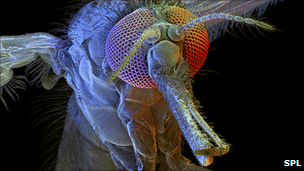| | General News 
[ 2011-04-21 ] 

Around a million people are thought to die from malaria each year GM mosquitoes offer malaria hope
Scientists believe they are closer to being able
to change the DNA of wild mosquitoes in order to
combat malaria.
In the laboratory, they made a gene spread from a
handful of mosquitoes to most of the population in
just a few generations, according to a report in
Nature.
If the right gene can be made to spread then
researchers hope to reduce the number of cases of
malaria.
Other academics have described the study as a
"major step forward".
The World Health Organisation estimated that
malaria caused nearly one million deaths in 2008.
Spreading resistance
Research groups have already created
"malaria-resistant mosquitoes" using techniques
such as introducing genes to disrupt the malaria
parasite's development.
The research, however, has a great challenge -
getting those genes to spread from the
genetically-modified mosquitoes to the vast number
of wild insects across the globe.
Unless the gene gives the mosquito an advantage,
the gene will likely disappear.
Scientists at Imperial College London and the
University of Washington, in Seattle, believe they
have found a solution.
They inserted a gene into the mosquito DNA which
is very good at looking after its own interests -
a homing endonuclease called I-SceI.
The gene makes an enzyme which cuts the DNA in
two. The cell's repair machinery then uses the
gene as a template when repairing the cut.
As a result the homing endonuclease gene is
copied.
It does this in such a way that all the sperm
produced by a male mosquito carry the gene.
So all its offspring have the gene. The process is
then repeated so the offspring's offspring have
the gene and so on.
In the laboratory experiments, the gene was spread
to half the caged mosquitoes in 12 generations.
Defeating malaria
Professor Andrea Crisanti, from the department of
life sciences at Imperial College London, said:
"This is an exciting technological development,
one which I hope will pave the way for solutions
to many global health problems.
"At the beginning I was really quite sceptical and
thought it probably would not work, but the
results are so encouraging that I'm starting to
change my mind."
He said the idea had been proved in principle and
was now working on getting other genes to spread
in the same way.
He believes it could be possible to introduce
genes which will make the mosquito target animals
rather than humans, stop the parasite from
multiplying in the insect or produce all male
offspring which do not transmit malaria.
Professor Janet Hemingway, from the Liverpool
School of Tropical Medicine, said the work was an
"exciting breakthrough".
She cautioned that the technique was still some
way off being used against wild mosquitoes and
there were social issues around the acceptability
of using GM technology.
"This is however a major step forward providing
technology that may be used in a cost effective
format to drive beneficial genes through mosquito
populations from relatively small releases," she
added.
Dr Yeya Touré, from the World Health
Organisation, said: "This research finding is very
important for driving a foreign gene in a mosquito
population. However, given that it has been
demonstrated in a laboratory cage model, there is
the need to conduct further studies before it
could be used as a genetic control strategy."
By James Gallagher
Health and Science reporter, BBC News
Source - BBC

... go Back | |




